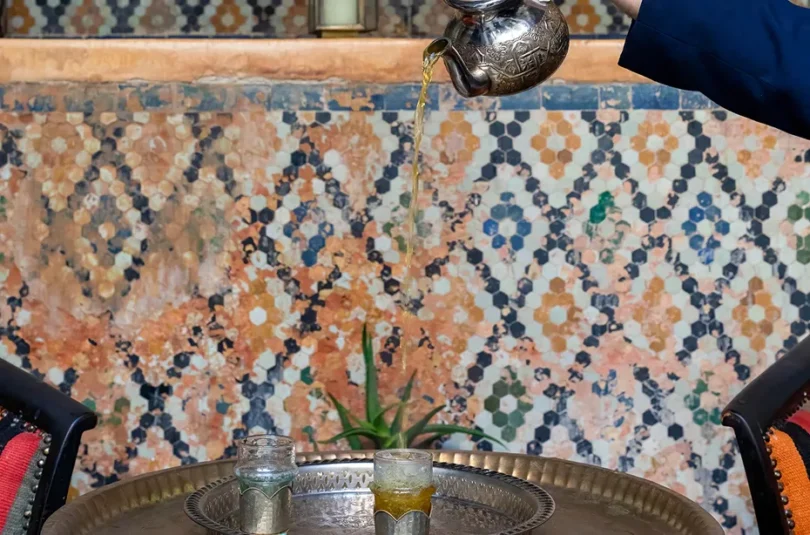A Country of Cups
In Morocco, every street hums with the sound of boiling water and conversation. From early morning until long after midnight, vendors set up small gas burners and foldable tables, turning sidewalks and market corners into miniature cafés. The air fills with the smell of roasted beans and crushed mint.
The rhythm of Moroccan life often begins with a cup — a brief pause, a shared moment, a sip before work or travel. Whether it’s the sharp kick of espresso in Casablanca or the cooling sweetness of mint tea by the road in Ouarzazate, Morocco’s street drinks are not only fuel but connection.
Coffee on the Move
Morocco’s relationship with coffee is mobile. You’ll find men with carts fitted with tiny espresso machines and propane tanks, pouring shots into glass cups with practiced speed. They serve workers heading to construction sites, taxi drivers waiting for passengers, and vendors setting up their own stalls.
The orders are simple but personal. A “nous nous” — half milk, half espresso — for those who prefer balance. “Kahwa horra” for the strong and bitter. Sometimes the cups are washed in a single bucket between refills; sometimes the coffee is brewed from beans ground that morning.
It’s fast, practical, and full of flavor. But more than caffeine, these mobile cafés offer something essential — a moment of stillness before the city starts moving again.
The Tea Keepers
Alongside the coffee vendors are Morocco’s tea masters — men who balance kettles, mint bundles, and trays of glasses as if born to it. Some stand by beaches, others outside bus stations or near old city gates. Their tools are basic: a kettle, a tray, a few glasses, and a small gas flame.
The ritual, however, is anything but simple. Leaves of green tea steep with fresh mint, sugar dissolves in slow swirls, and the pour is always from a height. The stream must be steady, the foam just right. It’s the street version of Morocco’s most refined ceremony — stripped of luxury but not of grace.
A glass of mint tea can cost as little as five dirhams, yet it carries the same meaning everywhere: welcome, rest, and warmth.
The Ritual of the Stop
To stop for tea or coffee on the street is not just about drinking. It’s about timing. In the morning, workers gather for caffeine and quick talk before the day begins. At noon, merchants sip tea under bits of shade while others rest against walls. By evening, friends meet for a slow coffee, watching the world pass.
Each vendor has regulars, each corner its own rhythm. Over time, these improvised cafés become landmarks — places where people reunite, gossip, or share silence.
In Morocco, the act of stopping to drink is as much about belonging as it is about refreshment.
The Tools of the Trade
There is a beauty in the simplicity of these setups. A dented kettle, a small burner, a bag of sugar, a few tea leaves, and maybe a folding stool or two. Coffee vendors carry their world on a trolley; tea sellers move with their trays.
Nothing is standardized, yet everything works. The aroma of mint, the hiss of the kettle, the clink of glass — all part of the performance. The design may be improvised, but the result is timeless: a familiar cup in an ever-changing city.
Social Currency
Tea and coffee are Morocco’s most democratic rituals. They cost little, yet they carry immense social weight. To share a cup is to open a conversation; to refuse one is to close it. On the street, hierarchy disappears — rich and poor, old and young, share the same sugar, the same warmth.
For travelers, these vendors are a map of human hospitality. For locals, they are part of daily survival. Both find the same comfort in the same steam.
Conclusion – Steam and Stillness
By nightfall, the burners dim. The last cups are washed, the last customers gone. The vendors pack their tools into crates and disappear into the alleys. What remains is the scent of mint and coffee lingering in the cool air.
Morocco’s streets never truly sleep; they simply pause between sips. In those pauses — between noise and silence, work and rest — the country breathes together, one glass at a time.


Leave a Reply